
Exploring the Benefits of Shipping Scales
If you’ve ever shipped anything, whether from home, work or the post office, you know that the first step in the process is weighing your parcel, which should be done with a shipping scale. This is for a variety of reasons, including determining the price of shipment and preventing overload. This blog will discuss what shipping scales are, their benefits, what factors to consider when choosing one, and give you a few suggestions about which one might be best for your needs.
Types of Shipping Scales
There are a variety of diverse types of shipping scales, each one fulfilling different purposes.
Bench Scales
Many bench scales are designed to be compact enough to sit on a benchtop and usually feature a rechargeable battery for convenient portability. This is an ideal choice when your space is limited and the items that you’re shipping aren’t exceptionally large or heavy. The mobile nature of the compact bench scale also means that it can be shared between multiple locations, mitigating the need for multiple scales.
Floor Scales
Instead of being placed on a bench, floor scales are kept on, well, the floor. This is because their capacity is higher than bench scales, so it’s easier to weigh heavy or large parcels when it’s not necessary to lift them. Many floor scales also feature rechargeable batteries for easy transportation, though they do need significantly more space than a bench scale.
Platform Scales
Platform scales boast the highest capacity of our shipping scales. They also generally take up the most room. Platforms have the ability to weigh pallets, crates and items such as large appliances for shipping.
Pallet Beams
For particularly large or unusually shaped shipments, pallet weigh beams may be ideal. The two beams are attached by a lengthy wire, which allows them to be separated to the desired distance apart to accommodate the pallet. These are handy as well because the beams don’t take up much space when not weighing, so they can be stored away easily.
Specialised Scales
The scales in this category aren’t mutually exclusive with bench, floor or platform scales, they can be any scale with an aptitude for a particular application.
Checkweighing Scales
Checkweighing scales are used when a parcel needs to be within predetermined weight limits. These scales make this process easier by alerting you, either by sound or by changing the color of the display when the parcel is above or below the limits.
Counting Scales
Counting scales are handy when shipping multiple small items of the same size. Instead of counting them all yourself and wasting time, counting scales take the weight of a small sample and use it to figure out how many items there are in total.
Label Printing Scales
Label printing scales can print weight, labels, QR and barcode stickers. When parcels are weighed, a label can be generated with the weight recorded as well as the number of pieces inside. This can then be added to the parcel before being loaded onto a lorry.

The Benefits of Shipping Scales
Having a dedicated shipping scale increases the accuracy of your weight measurements because your scale is suited to your operations. For example, a home business that sells homemade jewelry will likely require a bench scale rather than a platform scale, while a kitchen appliance company will need the higher capacity that a platform scale offers. For shipping companies, having multiple scales for varied sizes and hefts of parcels rather than one general scale for everything helps guarantee that small items get weighed just as accurately as a pallet.
Weighing parcels also provides organisation and inventory control, especially if they’re tagged with a label from a label printing scale. Parcels can then be stored according to weight, piece count or contents, depending on your preference. This also helps in the effort to reduce errors and potential losses, as the likelihood of a package being mislabeled or misplaced is lowered.
Shipping scales can also help you save time and money. Lorries can only hold so much weight before they’re unsafe to drive, which means they must be carefully packed so as not to be overloaded. For shipping companies, guaranteeing that their awfully expensive equipment is treated with care is extremely important. After all, a new lorry is a lot more money than a shipping scale.
Factors to Consider When Choosing a Shipping Scale

Whether you’re a small or large business, choosing the right shipping scale for your needs is significant. The first factor you want to consider is which capacity and readability you require. The higher the capacity, the larger parcels the scale can handle. However, the higher the capacity, the less accurate the readability, so keep in mind how precise you’d like your weights to be.
Another consideration is size and portability. Bench scales are compact and highly portable, which makes them perfect for locations with little space, while platform scales are usually permanent fixtures and need a large amount of dedicated floor space.
You may also be interested in a shipping scale with connectivity options. For example, many scales on Inscale offer an RS-232 interface, which allows them to be connected to printers and/or online software, such as AdamDU.
Last but not least, you need to consider whether you require a trade approved scale. Trade approval will allow you to legally set a price for a parcel based on its weight. This extra certification helps to guarantee that everyone is getting what they pay for, no more and no less, which certainly saves you money in government fines if you’re caught without one!
Which Shipping Scale is Right for You?
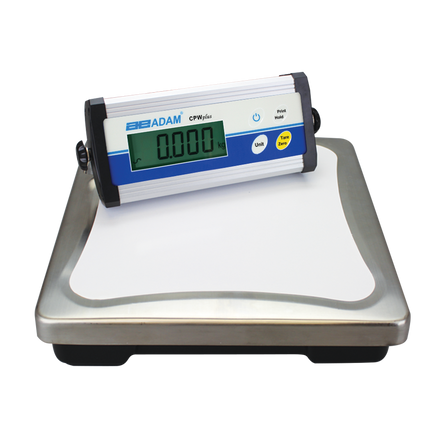
Capacities: 6kg – 200kg
Readabilities: 2g – 50g
Adam’s CPWplus S is an affordable, multi-purpose bench scale (or floor scale, if necessary) with a separate, wall-mountable display. It offers a robust, solid steel platform base as well as splashproof indicator. The CPWplus S features a hold function that freezes the result on the display, making record-keeping easier. For such a small scale, it has a remarkable capacity range, reducing your need for a secondary floor scale unless your parcels surpass 200kg.
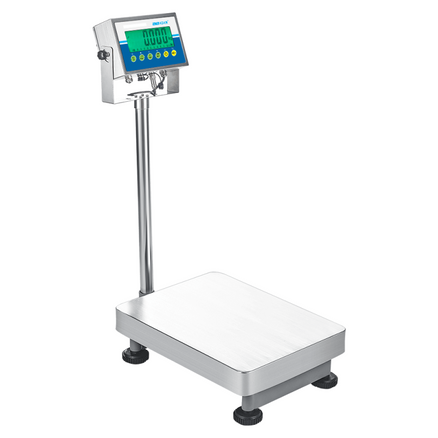
Capacities: 150kg – 600kg
Readabilities: 5g – 20g
The AGF floor scale and its indicator are constructed from stainless steel, making them water, rust and bacteria-resistant. With an RS-232 output, you can instantly send weight data to a PC or printer. Though not a specialised scale, the AGF also features checkweighing capabilities, giving you two-in-one. Need a trade-approved model? Take a look at the AGF-M.
PT Platform Scale & GK Indicator
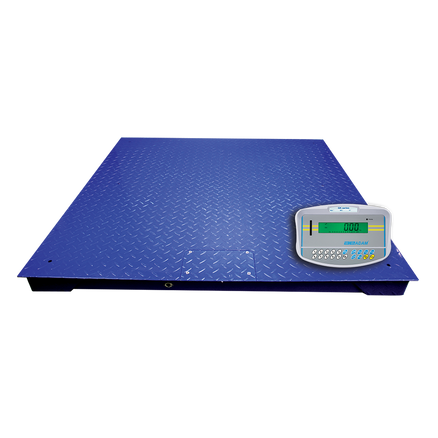
Capacities: 1 tonne – 3 tonne
Readabilities: 200g – 500g
The PT platform scale is designed for weighing pallets, crates, large items and containers in warehouses, production floors or loading docks. Its diamond-plate surface provides necessary traction to stabilise loads, and optional ramps help to facilitate loading and unloading. The GK indicator is known for its checkweighing capabilities, its RS-232 output and rechargeable battery.
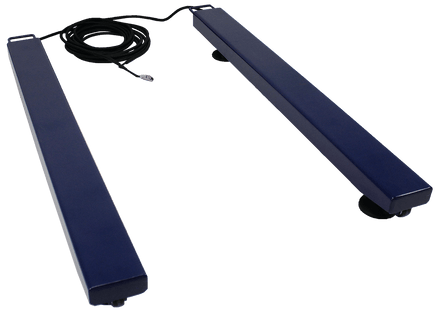
Capacities: 1 tonne – 3 tonne
Readabilities: 200g – 1000g
While the PT platform scale requires a sizable part of space in your work area, the AELP weigh beams have the advantage of being easily portable with their lightweight design, handles and wheels, so they can be stored away until their next use. Place the beams the necessary distance apart to weigh pallets and abnormally sized goods. These are usually a more cost-effective option compared to most platform scales.
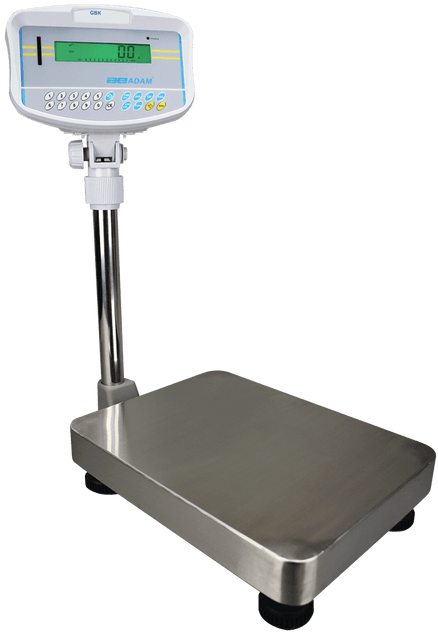
Capacities: 8kg – 120kg
Readabilities: 0.1g – 5g
The GBK is a specialised checkweighing scale that offers a full numeric keypad for setting High/Low limits, as well as unit weight and sample entry. This scale has an audible alarm that sounds when an item is outside of your predetermined limits. Additionally, a rechargeable battery is included so you can operate almost anywhere! Need an approved version? See the GBK Mplus.
BKT Label Printing Bench/Floor Scale
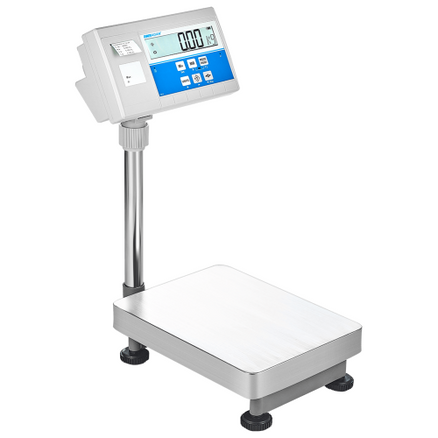
Capacities: 8kg – 600kg
Readabilities: 0.1g – 50g
Sturdy and durable, the BKT label printing scale was designed with warehouses, shipping departments and distribution centres in mind. The BKT features a built-in printer with the ability to print weight, labels, QR codes and barcodes in multiple languages. With an RS-232 output, you can connect to a PC for fully customisable label design.
Have any questions or aren’t sure which shipping scale is right for you? Contact the Inscale team at 01908 972 660.

Leave a comment